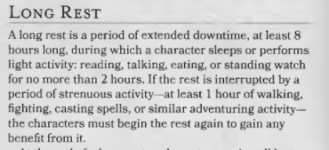Blue
Ravenous Bugblatter Beast of Traal
Is there a definitive rule if a caster knows if a target succeeded on a save or not?
The example that came up is someone (a bard) cast Charm Person, which has no visible effect when cast. The target (an enchanter wizard who also has the spell) identified the spell as it was being cast, saved, and acted friendly.
Outside of other checks (deception vs. insight, etc.) is there any inherent knowledge by the caster if the spell save was successful or not in the rules? There was in some earlier editions, but 5e is it's own definition.
Another example could be several targets in fireball, and one takes half damage thanks to fire resistance, not a successful save. Outside other checks, would the caster inherently know that target had failed their save?
The example that came up is someone (a bard) cast Charm Person, which has no visible effect when cast. The target (an enchanter wizard who also has the spell) identified the spell as it was being cast, saved, and acted friendly.
Outside of other checks (deception vs. insight, etc.) is there any inherent knowledge by the caster if the spell save was successful or not in the rules? There was in some earlier editions, but 5e is it's own definition.
Another example could be several targets in fireball, and one takes half damage thanks to fire resistance, not a successful save. Outside other checks, would the caster inherently know that target had failed their save?





